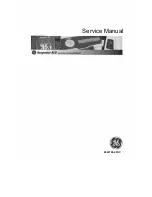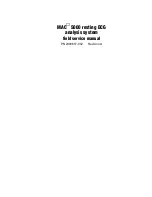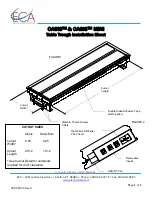
GE
D
IRECTION
FQ091019, R
EVISION
2
V
IVID Q
N S
ERVICE
M
ANUAL
Chapter 3 - System Setup
3-19
Section 3-6
Ensuring Protection from EMI
The Vivid q N unit has been designed to minimize the effects of Electro-Magnetic Interference (EMI).
Many of the covers, shields, and screws are provided primarily to protect the system from image
artifacts caused by this interference. For this reason, it is imperative that all covers and hardware are
installed and secured before the unit is put into operation.
Ensure that the system is protected from electromagnetic interference (EMI), as follows:
•
Operate the system at least 15 feet away from equipment that emits strong electromagnetic
radiation.
•
Operate the system in an area enclosed by walls, floors and ceilings comprised of wood, plaster or
concrete, which help prevent EMI.
•
Shield the system when operating it in the vicinity of radio broadcast equipment, if necessary.
•
Do not operate mobile phones or other EMI emitting devices in the ultrasound room.
•
Verify that all EMI rules listed in the following table are followed:
NOTE:
The Vivid q N
ultrasound unit is approved for use in hospitals, clinics and other environmentally
qualified facilities, in terms of the prevention of radio wave interference. Operation of the
ultrasound unit
in an inappropriate environment can cause electronic interference to radios and
television sets situated near the medical equipment.
Table 3-10 EMI Prevention/ Abatement
EMI Rule
Details
Ground the unit.
Poor grounding is the most likely reason an ultrasound unit will have noisy images. Check
the grounding of the power cord and power outlet.
Be aware of RF sources.
Keep the unit at least 5m (16.4 ft) away from other EMI sources. Special shielding may be
required to eliminate interference problems caused by high frequency, high powered radio
or video broadcast signals.
Replace and/or reassemble
all screws, RF gaskets,
covers and cores.
After you finish repairing or updating the system, replace all covers and tighten all screws.
Any cable with an external connection requires a magnet wrap at each end. Install the shield
over the front of the card cage. Loose or missing covers or RF gaskets allow radio
frequencies to interfere with the ultrasound signals.
Replace broken RF gaskets.
If more than 20% or a pair of the fingers on an RF gasket are broken, replace the gasket.
Do not turn on the unit until any loose metallic part is removed and replaced if needed.
Do not place labels where
RF gaskets touch metal.
Never place a label where RF gaskets meet the unit. Otherwise, the gap created will permit
RF leakage. In case a label has been found in such a location, move the label to a different
appropriate location.
Use GE specified harnesses
and peripherals.
The interconnect cables are grounded and require ferrite beads and other shielding. Cable
length, material, and routing are all important; do not make any changes that do not meet
all specifications.
Take care with cellular
phones.
Cellular phones may transmit a 5 V/m signal that causes image artifacts.
Properly address peripheral
cables.
Do not allow cables to lie across the top of the card cage or hang out of the peripheral bays.
Loop any peripheral cable excess length inside the peripheral bays or hang on the hooks
provided below the console. Attach the monitor cables to the frame.
















































